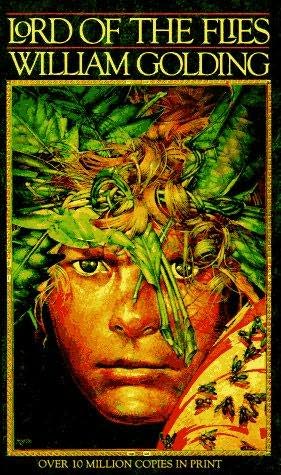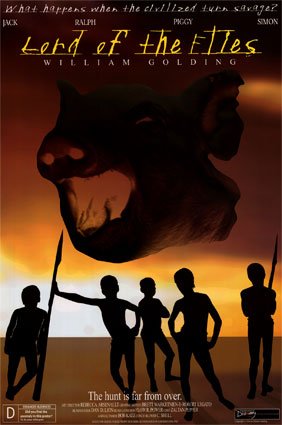Friday, February 27, 2009
Parth
Yes, we don’t want to wreck the book’s ending. To all interested, read the book if you haven’t yet.
Roland
Yes, I agree. But there is no point in wrecking the story for the other potential readers, who might be reading this blog right now.
Roland

The historical context regarding Golding’s life is also pretty interesting. The whole novel can be seen as a symbolic representation of the events between the years 1918 and 1945, the end of WW1 to the end of WW2. However, this is covertly described as not actually being WW2 when Piggy tells Ralph, ‘Didn’t you hear what the pilot said? About the atom bomb? They’re all dead.’ This is a reference to atom bombs other than the ones dropped on Hiroshima and Nagasaki.
Parth
Also, Simon’s character does seem to be the neutral character in the novel. He is as eager to help Piggy, and even Jack, as he is to help Ralph. The Lord of the Flies continues from the quote you mentioned earlier, “(You like Ralph a lot, don’t you?) And Piggy and Jack?” This displays Simon’s biblical representation of Jesus, one who wants to do good for all of the boys.
Roland
Oh yes. Ralph as also mentions Simon, “ He’s (Simon) queer. He’s funny,” in Chapter 3. Simon’s interest in nature also alludes his Christ-like personality.
Parth
Yes, but doesn’t it remind you of how Christ helped the poor and needy in time of crisis and how he was despised by those in power, political and religious.
Roland
The answer to that is written several chapters later, in Chapter 8, when Simon imagines the ‘Lord of the Flies’ is speaking to him. The ‘Lord of the Flies’ says, “they think you’re batty. You don’t want Ralph to think you’re batty, do you? You like Ralph a lot, don’t you?” This shows that Simon wants to be accepted by Ralph and the group, and is willing to work diligently in order to gain recognition. It also hints that Simon was not accepted in his past life as a choirboy with Jack and the hunters. This is evident when Simon faints for the first time in Chapter 1 and Jack reacts by saying, “He’s (Simon) always throwing a faint… he did in Gib,; and Addis; and at matins over the precentor.” “This lat piece of shop brought sniggers from the choir.”
Parth
Yes, Simon’s qualities as an individual are very different from the rest of the boys’. Golding asks questions of us, questions that we can answer when looking at examples using historical context. For example, why does Simon help Ralph build the shelters?
Roland
William Golding must have been thinking exactly that. Each of the protagonists are very different and their individuality has been very well constructed by William Golding. For example, Simon’s character is that of an innocent victim of the barbarism on the island.
Parth
 William Golding has discussed some very important issues in the book, issues that we, as individuals, do not go into in our conversations. His portrayal of the main characters, especially Simon, is very realistic. Reading the book gets even better when you realise the symbolism and the historical context of the novel. The references to World War 2 and the biblical allusions are enlightening when thinking ‘Oh, that happened at a global scale. This is
William Golding has discussed some very important issues in the book, issues that we, as individuals, do not go into in our conversations. His portrayal of the main characters, especially Simon, is very realistic. Reading the book gets even better when you realise the symbolism and the historical context of the novel. The references to World War 2 and the biblical allusions are enlightening when thinking ‘Oh, that happened at a global scale. This is  a symbolic retelling’.
a symbolic retelling’.
Subscribe to:
Posts (Atom)



